
The Chairman and CEO of Air Peace Limited, Dr Allen Onyema, has said that the President Ahmed Bola Tinubu’s administration is determined to solve the perennial infrastructural challenges that have over the years retarded the growth of air travel in Nigeria.
Onyema said that with the determination of President Tinubu and his team in the aviation sector to transform airport facilities and modernise them with the ambitious plans to address decades-old airport infrastructure challenges, industry stakeholders are of the view that once completed, the transformation will not only improve passenger experience but also unlock new revenue streams for airlines.
Speaking at the 29th League of Airport and Aviation Correspondents (LAAC) Annual Conference in Lagos, Onyema described inadequate airport infrastructure as one of the most pressing barriers to the growth and profitability of Nigerian airlines.
He stressed that the absence of proper transit facilities at key airports has long hindered the country’s ability to function as a true regional hub, costing airlines both passengers and revenue.
He also explained that Nigeria airlines operating in West and Central Africa lose a competitive edge when connecting passengers because they must clear immigration, undergo customs checks, and recheck their baggage simply to transit through Nigeria, a process that often drives them to other African airports.
He also noted that the lack of seamless connectivity has particularly affected the ability of domestic carriers to integrate regional routes into global connections.
Onyema welcomed the government’s recent interventions, including the plan to rebuild the Lagos airport facilities to accommodate modern transit operations, expressing confidence in the administration’s commitment, noting that with sustained focus, the country could, within two years, possess the infrastructure needed to compete with Africa’s leading aviation hubs.
He emphasised that such infrastructure upgrades act as a form of indirect financing for airlines by reducing operational inefficiencies, cutting avoidable costs, and creating conditions for sustainable expansion.






